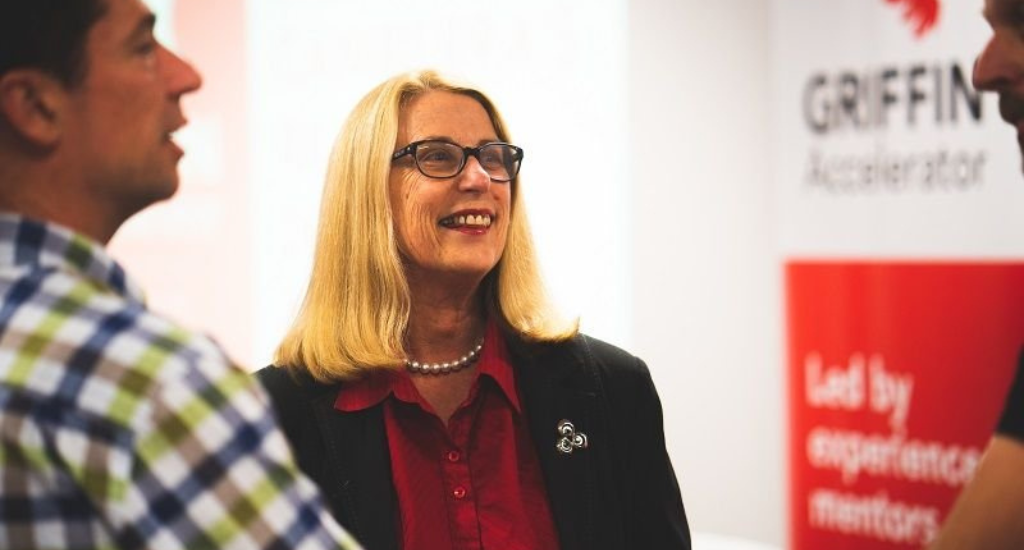- 6 March 2024
- Posted by: Canberra Innovation Network
- Categories: Feature, General News, GRIFFIN Accelerator, Women in Innovation

Article written by Serina Bird for the Moore Street Journal.
The International Women’s Day 2024 theme is invest in women: accelerate progress. Editor Serina Bird talks to angel investor Sylvia Tulloch about why she invests in early-stage startups and how she makes a difference as an investor and mentor.
Sylvia Tulloch and her husband are serial entrepreneurs. They exited the last company they founded in 2012 after the company had been listed on the Australian Stock Exchange for 7 years. Tulloch could have spent the rest of her life on one big holiday – or started another company. But she wanted to give back. So, she decided to share her wealth ‘in the most general use’ in several companies, investing in multiple rather than just one. The aim was not just to provide financial support but to support a CEO or founder in any way she usefully could.
A small amount makes a big difference
Tulloch joined Capital Angels and was then approached to participate as a mentor and investor in the first Griffin Accelerator Program. That was 10 years ago – she has participated in every program but one since, making her one of a select few mentors with a decade of experience with the program.
“By investing a comparatively small amount of money, you can make a big difference”
Tulloch likes supporting very early-stage startups. ‘It’s emotionally and intellectually my space,’ she said. ‘By investing a comparatively small amount of money, you can make a big difference.’
Tulloch describes herself as being genetically (and by experience) able to cope with risk, ‘which you have to be’ to be an investor.
‘I really enjoy Griffin,’ she said. ‘I enjoy being with the young (and the not so young) founders. I enjoy it if I can help them. That’s been my main driver,’ she said, before adding that she also enjoys interacting with mentors.
Becoming braver as a mentor
Tulloch said when she was first approached to become a Griffin Accelerator Program investor, she was ‘definitely’ interested but only in sectors such as cleantech and manufacturing. She didn’t feel she could mentor in sectors where she didn’t have expertise.
“Sometimes my support is about introducing them to people – not just investors”
But what she learnt was that founders themselves are often experts in their fields, so they don’t require deep tech or specific sector knowledge. Instead, they often need general business advice. This includes insights on the importance of intellectual property, government grants and tax programs, budgeting help and personal support such as instilling confidence in what they are doing.
‘Sometimes my support is about introducing them to people – not just investors. For example, I might connect them with a patent lawyer or various other services they will need,’ she said.
As a result, she has become more courageous in mentoring startups outside her comfort zone.
An example of the type of support she has provided as a mentor includes outlining how and why a startup could become a proprietary company. In another, she worked with a young founder who had ‘a couple of ideas’ and needed help to separate them to distinguish which company owned which patent. Meanwhile, another founder (who had been an educator rather than a businessperson) needed help with basic budgeting tools.
Where are all the female angels?
Tulloch acknowledges that there are still far fewer female angel investors than male. And she’s not sure what the reason for that is, although she has a theory.
‘Maybe it goes back to the fact that most people who are angel investors have had companies and sold them. They then deploy money back into other companies,’ she said. ‘Maybe the problem is that we do not yet have as many women who are selling their businesses – in the past, female founders were very rare.’
But she does believe the number of female angel investors is likely to rise, especially because of programs aimed at getting women involved. ‘It’s a pipeline thing,’ she said.
Female angel in the room

While there aren’t as many female angel investors as males, there are some. ‘We all know each other pretty well,’ said Tulloch of the angel investing community. Having worked in a large multinational company and then had her own business, Tulloch understands well the experience of being the only woman in the room and how female founders may feel pitching to an almost male audience. ‘It can be intimidating,’ she said. ‘It’s not uncomfortable exactly, but it feels a bit different in terms of attitudes.’
That said, Tulloch feels the questions investors make to startups are individual and generally don’t show gender bias. However, she has registered a few occasions where a female startup founder’s commentary on a pitch suggested they didn’t know what they were doing – the implication being that they were female. But she said it doesn’t happen often.
Tulloch doesn’t specifically invest in female founders. Still, there are times when she has invested in female founders she has liked – and even been convinced by female founders to invest in sectors she hadn’t previously understood. For instance, she invested in Wildlife Drones, a female-founded drone tracking startup, even though it wasn’t her expertise.
Another female-led startup she has mentored and invested in through the Griffin Accelerator Program is Syenta, a 3D electronics printing startup co-founded by Dr Jekaterina Viktorova from ANU. ‘I could understand technically what was possible, and you did have to understand the tech to appreciate the opportunity. I could share that with other mentors, and they were quite supportive. If I had not been there, I’m not sure it could have happened. Jekaterina is great, and her tech was something I was completely able to get across.’
Return on investment
Tulloch said that angel investors are a ‘reasonably competitive bunch’, at least with themselves. They all want to do well from their investments. But financial rewards are not just about the dollars but also a measure of how well they are mentoring.
After a decade of angel investing, Tulloch said that she has only had one partial exit from a startup that she has invested in. That occurred when a funding round was oversubscribed, and the founders wanted to sell down some shares. She used that opportunity to sell 20% of her stake for significantly more than her initial investment. It was a big return ten years in the making.
While she might not be raking in the big bucks (at least not yet), Tulloch said she usually gets more joy out of investing in and working with startups than she would by spending the money on an international trip.
Rejection hurts

Tulloch said one of the greatest gifts an angel investor can give a startup is explaining that receiving a ‘no’ from a potential investor isn’t an affront to them or their business.
‘It can be very disappointing if a startup does a great presentation, and then they [the investor] says thank you very much but I’m not investing,’ she said. ‘They are simply making a decision to where they are at in their world,’ noting the decision may be based on how much funds investors have available, whether it’s the right sector, or whether supporting the project might offend any current investors or clients. Basically, it might have little to do with the presentation or the viability of the project.
She said in her experience, in the corporate world a ‘no’ to a pitch for an idea means it won’t go ahead, while a ‘yes’ means it will go up the line: there is no in-between. But a ‘no’ to an investment decision for a startup is a bit different. The startup may continue, but in a different form or way. And it will likely continue to approach different investors.
Female founders
Tulloch acknowledges that barriers to female-founded startups still exist. ‘The numbers speak for themselves,’ she said. [In the US, female founded companies received 1.8% of venture capitalist startup funding in 2023, compared with 4% in Australia.] ‘But when I’ve been in a room with investors, I haven’t observed discrimination.’
Perhaps there is something special about Canberra, based on a conscious decision by the Canberra Innovation Network to mainstream gender equality. Tulloch acknowledges Canberra does better than many other places on gender equality, noting that the Australian Public Service had been early to use positive discrimination to increase female participation.
‘At the time, I wasn’t in favour of positive discrimination,’ she said. ‘We felt women should be good enough to get the jobs. But looking back, I think it was necessary, and it reset the dial. It’s why I now believe there should be positive discrimination on boards to ensure greater diversity.’
Tulloch has seen a lot of change in her career. She was the first female in her engineering course at university; the lecturers would address the class as ‘gentlemen and Miss Ferry’. Then, when she started working at a laboratory at 19, she received 90% of men’s wages – which was then set in the award. She didn’t make a fuss at the time because she knew that equal pay had been legislated and would come soon to the award. However, when talking to younger women, she can understand they are less patient to see discrimination eliminated.
And overall, she thinks that things are getting better for gender equality – including on the startup funding front.

